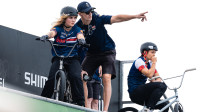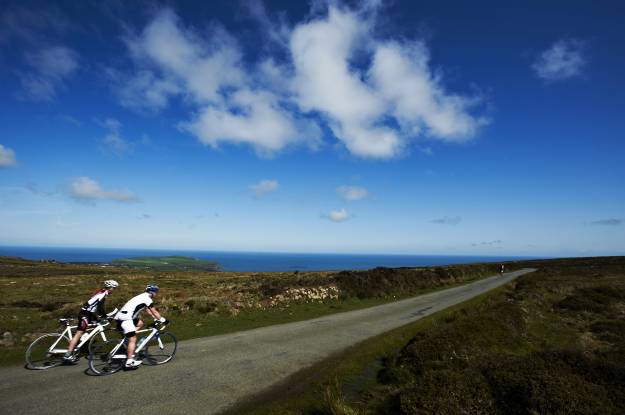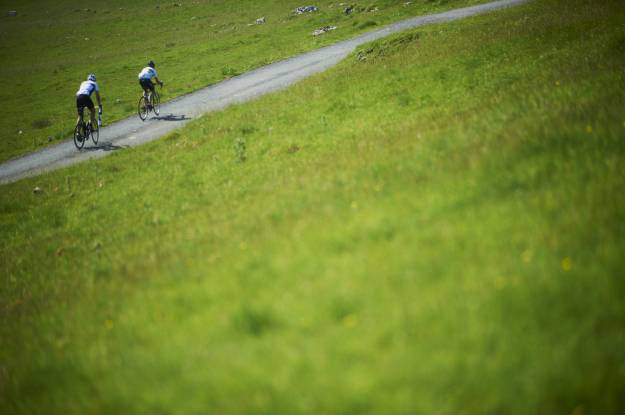A no guts, no glory approach from Lewis Askey from the drop of the flag in Antwerp saw him finish fifth in a sprint for the line in Leuven, Belgium.
The 21-year-old didn’t just pick one moment during the race to attack, but numerous as he rode in the under-23 men’s road race, his first appearance as an under-23 at a UCI Road World Championships.
It will no doubt be one will be one to remember for the young Brit as he showed great spirit to get a top result; Askey will already be thinking about 2022, taking confidence from the day’s ride.
In the first race of the day, the junior men placed their faith in Max Poole who in a field full of impressive talent from around the world, finished ninth overall. Both the under-23 and junior men’s races were won from breaks established on the final Wijnpers climb in Leuven.
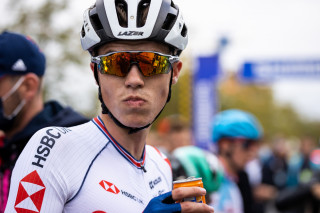
Junior Men’s Road Race
An early start awaited the junior men on Friday morning at the start line in Leuven, Belgium. With a pre-5am wake-up call and 8.15am local start time, the British quartet of Jack Brough, Finlay Pickering, Max Poole, and Josh Tarling will have been hoping for a good night’s sleep prior.
121.4 kilometres, eight laps around a circuit of Leuven awaited a total of 178 junior men competing to be World Champion. Each lap would consist of tight corners, narrow streets, cobbles and four short sharp climbs for good measure.
A nervous bunch at the start saw a crash just metres from the start line before the peloton had even left the neutral zone. A slowing of the pace car would allow those riders caught in the crash to join the peloton once again, be it battered and bruised.
Once the flag dropped however, more carnage ensued with more crashes and riders abandoning as countries jostled to be at the front and possibly get into the day’s break.
It would take 15 kilometres for the break to form, with the peloton allowing the gap to grow to 30 seconds. In the break was British representation in Josh Tarling, fresh from his silver medal in the junior men’s individual time trial on Tuesday; with him, just two riders Milan Kadlec (Czech Republic) and Luis-Joe Luehrs (Germany).
If premonitions aren’t his thing, they probably should be, Tarling telling the television reporters prior to the start, “I think it’s a good race to be near the front, it’s not a race to chill at the back, you’re going to have to make sure you’re up there all of the time. I’m hoping it will be whittled down to either a small group or a breakaway.”
“It feels really good to be here, I’m really excited. - I love the course here, it looks sick. The climbs are good, and yeah, it’s an honour to put this jersey on and represent my country.”
The gap to the breakaway would grow only once to over a minute at the 89-kilometre mark as the three riders made their way over the Keizersberg for the third time during the race.
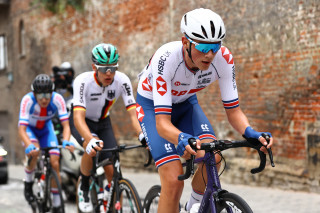
Various attempts from the Norwegian, French, and Danish teams would prove unfruitful to bring them back but eventually the time would slowly come down and the three would re-join the peloton with 32.2 kilometres (two laps) to go.
It was at this very inopportune moment, Tarling suffered a mechanical with television pictures showing a buckled rear wheel as he waited for the team car. A quick bike change was well timed to allow the Welsh rider to get into the peloton, but having spent most of the day out front, with 20 kilometres remaining, Tarling’s legs could push no more, and he slipped out the back of the bunch.
In terms of action at the front, at the same time Dario Igo Belletta (Italy) and Daniel Schrag (Germany) had escaped the peloton and were pushing for the line. Behind them Finlay Pickering was joined by Eddy le Huitouze (France) to chase them down, and a further solo effort by Pierre Gautherat (France) meant he would join them also to create a group of five.
On one lap to go Simon Dalby (Denmark) was bridging the gap to the group slowly and once he caught them, was joined by Per Strand Hagenes (Norway) and Romain Gregoire (France) to create a leading group of eight.
Pickering tested the legs at 6.8 kilometres to go on the Decouxlaan climb but was chased down by Dalby, not allowing the young Brit to escape up the road. The attack that would stick was in fact on the next climb of Wijnpers.
Unfortunately, the attack this time was from Norway’s Per Strand Hagenes, and right behind him a crash, hindering Great Britain hope’s and spelling the end of Pickering’s day.
Those brought down were quickly swallowed up by what was now a thin resemblance of a peloton, the only rider to avoid this fate was Gregoire (France) dangling between the Norwegian and the bunch and just three kilometres to go.
Hagenes would lead all the way to line, taking a commanding win allowing himself to revel in the moment and celebrate arms a wide with 50 metres to go.
Gregoire of France would finish 19 seconds down, with the main group just behind him finishing a further five seconds back, and sprinting for third. Among them was Max Poole who would finish in ninth position overall, Madhis Mihkels (Estonia) would win bronze.
Results
Per Strand Hagenes (Norway) 2:43:48
Romain Gregoire (France) +19
Madis Mihkels (Estonia) +24
----
9. Max Poole (Great Britain) +24
25. Jack Brough (Great Britain) +24
32. Finlay Pickering (Great Britain) +56
48. Josh Tarling (Great Britain) +6:33
U23 Men’s Road Race
The U23 men’s road race was the second of the day and to be contested over 160.9 kilometres from Antwerp to Leuven, completing one and a half laps of the Leuven circuit, one lap of the Flandrien circuit and a further two and a half laps again of the Leuven circuit, before finishing at the same finish line as the junior men used just hours earlier.
If the neutralised roll-out of the junior men’s race was hectic, the under-23 men’s was nine kilometres of carnage. Various crashes, riders stopping for mechanicals and visits to the doctor’s car, only meant one thing, a red flag, stopping the race and getting everyone back together again.
After a short delay we were finally racing, Lewis Askey, Robert Donaldson, Oliver Stockwell, Ethan Vernon, and Samuel Watson all representing Great Britain.
Any early break would form in the race consisting of Logan Currie (New Zealand), Gleb Karpenko (Estonia) and Adam Ward (Ireland). They would grow their lead to three minutes 18 seconds at the halfway point just before taking on the first climb of the Flandrien circuit, the Smeysberg.
At 700 metres long and a maximum of gradient of 16%, Currie proved himself the climber of the group dropping Karpenko and putting Ward under pressure. The second climb of the circuit is the cobbled Moskesstraat, and it was here Ward finally cracked as Currie pressed on.
That was until he was involved in a confusing moment, the New Zealand rider going the wrong way or at least being directed the wrong way, forcing him to slam to a halt along with the television motorbike.
Lewis Askey at the same time had picked the climb as his first opportune moment to attack with 58.6 kilometres to go. The next time was saw Askey on camera he was cresting the climb seconds behind Hugo Page (France) with Currie on his wheel.
They would shortly be joined by an Italian representative; however, it wouldn’t be long before they were all brought back by Page’s teammates from France, leaving the Frenchman to look at them in astonishment. With everyone back together, Stockwell and Watson were on the front of the peloton for Great Britain patrolling things with 55km to go.
The second time over the Smeysberg caused numerous attacks, it would take a further 10 kilometres for a group of nine to form with a gap of 30 seconds to the peloton, and two riders caught in the middle with 19 seconds on the peloton.
Those two riders would eventually join the group ahead to form 11 riders, but with no Great Britain or hosts Belgium represented in either group, it meant a chase would come from behind at some point.
With the gap never growing to more than 35 seconds they were soon brought back with one lap (15 kilometres) to go on the Leuven circuit.
Mauro Schmid (Switzerland) chose this moment to jump off the front and attack, trying to time trial his way to the finish, but when he came up against the mightily steep Wijnpers climb, the same spot that decided the junior men’s race, his lead would be no longer.
It would be Filippo Baroncini (Italy) who attacked at that same moment and rode all the way to the line to take gold, doing so wearing number one on his back thanks to countryman Samuele Battistella winning the last running of the under-23 men’s road race in Yorkshire, 2019.
The remaining riders would be forced to sprint for silver, and despite a couple of gutsy last attacks by Askey of Great Britain, and a sprint from far out, it would be fifth for the 20-year-old, a fine debut in his first under-23 world championship road race.
Sam Watson wasn’t far behind taking 14th place. Biniam Ghirmay Hailu (Eritrea) would take silver, Eritrea’s first ever UCI Road World Championships medal, and Olav Kooij (Netherlands) bronze.
Results
Filippo Baroncini (Italy) 3:37:36
Biniam Ghirmay Hailu (Eritrea) +2
Olav Kooij (Netherlands) +2
----
5. Lewis Askey (Great Britain) +2
14. Sam Watson (Great Britain) +2
74. Robert Donaldson (Great Britain) +4:30
110. Ethan Vernon (Great Britain) +11:39
111. Oliver Stockwell (Great Britain) +11:39



